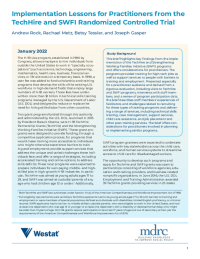Implementation Lessons for Practitioners from the TechHire and SWFI Randomized Controlled Trial

This brief highlights key findings from the implementation of the TechHire and Strengthening Working Families Initiative (SWFI) programs and offers considerations for practitioners. The programs provided training for high-tech jobs as well as support services to people with barriers to training and employment. Presented especially for a practitioner audience and derived from a rigorous evaluation, including visits to TechHire and SWFI programs, interviews with staff members, and a review of program participation data, the brief describes staff members’ experiences of facilitators and challenges related to recruiting for these types of training programs and delivering a range of services, including technical skills training, case management, support services, child care assistance, and job placement and other post-training services. The brief offers considerations for practitioners involved in planning or implementing similar programs.
In September 2016, the U.S. DOL Chief Evaluation Office awarded Westat, with MDRC, a contract to conduct an evaluation of the 53 TechHire and SWFI programs. This brief is based on lessons from one element of that evaluation: a randomized controlled trial of a small subset of the 53 TechHire and SWFI programs—three TechHire programs and two SWFI programs—that explored the implementation and short-term impacts of TechHire and SWFI. In particular, this brief focuses on findings from the implementation analysis that was part of the RCT; data sources for the implementation analysis included observations of TechHire and SWFI programs, interviews with staff members, and a review of program participation data.







